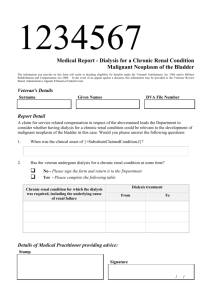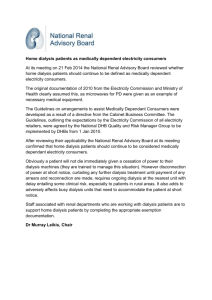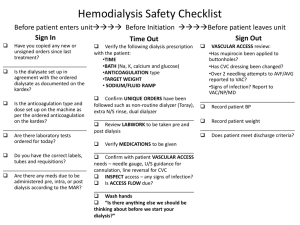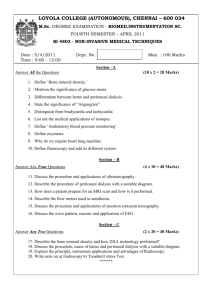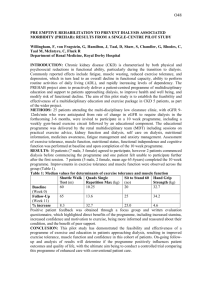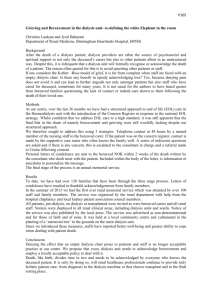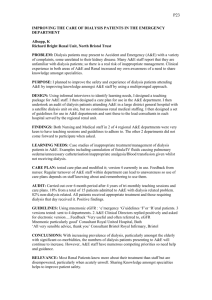F042 04 (CHS31) Assess and agree the efficacy of the dialysis therapy
advertisement
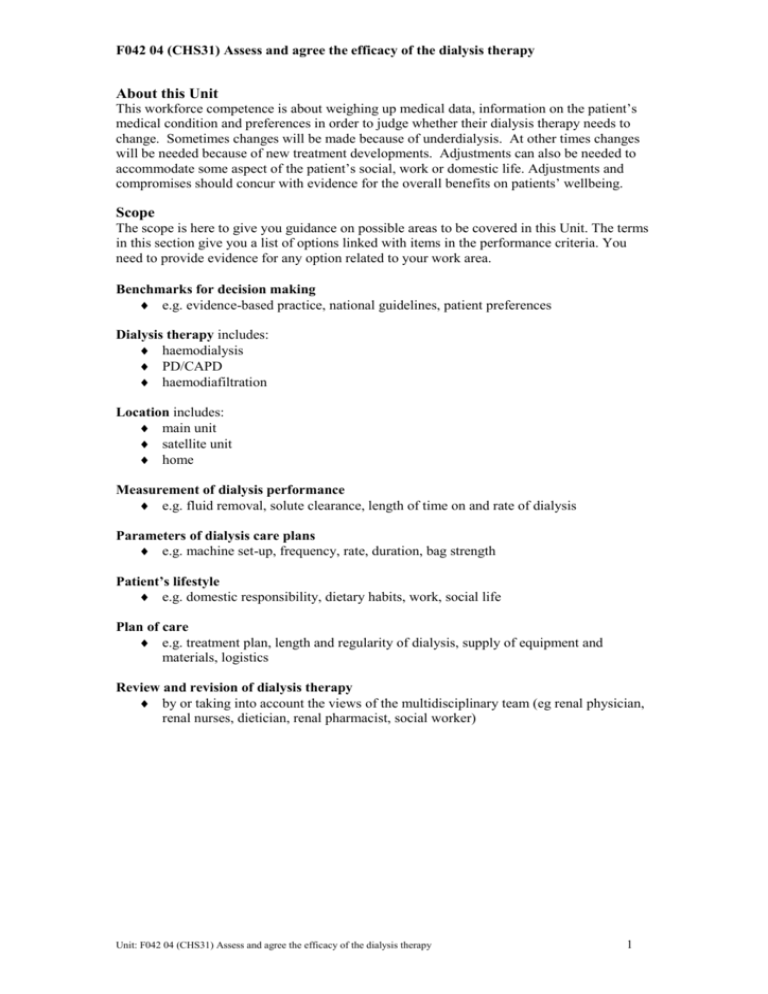
F042 04 (CHS31) Assess and agree the efficacy of the dialysis therapy About this Unit This workforce competence is about weighing up medical data, information on the patient’s medical condition and preferences in order to judge whether their dialysis therapy needs to change. Sometimes changes will be made because of underdialysis. At other times changes will be needed because of new treatment developments. Adjustments can also be needed to accommodate some aspect of the patient’s social, work or domestic life. Adjustments and compromises should concur with evidence for the overall benefits on patients’ wellbeing. Scope The scope is here to give you guidance on possible areas to be covered in this Unit. The terms in this section give you a list of options linked with items in the performance criteria. You need to provide evidence for any option related to your work area. Benchmarks for decision making e.g. evidence-based practice, national guidelines, patient preferences Dialysis therapy includes: haemodialysis PD/CAPD haemodiafiltration Location includes: main unit satellite unit home Measurement of dialysis performance e.g. fluid removal, solute clearance, length of time on and rate of dialysis Parameters of dialysis care plans e.g. machine set-up, frequency, rate, duration, bag strength Patient’s lifestyle e.g. domestic responsibility, dietary habits, work, social life Plan of care e.g. treatment plan, length and regularity of dialysis, supply of equipment and materials, logistics Review and revision of dialysis therapy by or taking into account the views of the multidisciplinary team (eg renal physician, renal nurses, dietician, renal pharmacist, social worker) Unit: F042 04 (CHS31) Assess and agree the efficacy of the dialysis therapy 1 F042 04 (CHS31) Assess and agree the efficacy of the dialysis therapy SPECIFIC EVIDENCE REQUIREMENTS FOR THIS UNIT Simulation: Simulation is NOT permitted for any part of this unit. The following forms of evidence ARE mandatory: Direct observation: Your assessor must observe you in real work activities which provide a significant amount of the performance criteria for most elements in this unit. For example how you communicate with the individual to make an assessment of their wellbeing and their feelings about dialysis. Reflective Accounts/professional discussion: These are recordings of your real work practice, which show your understanding of the individual’s condition and how the treatment they are receiving affects this. You will need to describe and explain the methods you use to monitor the treatment and describe how you interpret the data and make changes to the plan of care. Competence of performance and knowledge could also be demonstrated using a variety of evidence from the following: Questioning/professional discussion: May be used to provide evidence of knowledge, legislation, policies and procedures which cannot be fully evidenced through direct observation or reflective accounts. In addition the assessor or expert witness may also ask questions to clarify aspects of your practice. Expert Witness testimony: Can be a confirmation/authentication of the activities described in your evidence which your assessor has not seen. This could be provided by a work colleague or an external individual you deal with on a regular basis. Products: For this unit, products may include records and reports related to the treatment of an individual. You need not put confidential records in your portfolio; they can remain where they are normally stored and be checked by your assessor and internal verifier. If you do include them in your portfolio they should be anonymised to ensure confidentiality Assignments/projects: you may have studied infection control and renal failure related to your job role, and have completed some formally assessed work as part of an in service course, this may provide evidence of knowledge and understanding which your assessor can use. GENERAL GUIDANCE Prior to commencing this unit you should agree and complete an assessment plan with your assessor which details the assessment methods you will be using, and the tasks you will be undertaking to demonstrate your competence. Evidence must be provided for ALL of the performance criteria, ALL of the knowledge and the parts of the scope that are relevant to your job role. The evidence must reflect the policies and procedures of your workplace and be linked to current legislation, values and the principles of best practice within the Health Sector. This will include the National Service Standards for your areas of work and the individuals you care for. All evidence must relate to your own work practice. Unit: F042 04 (CHS31) Assess and agree the efficacy of the dialysis therapy 2 F042 04 (CHS31) Assess and agree the efficacy of the dialysis therapy KNOWLEDGE SPECIFICATION FOR THIS UNIT Competent practice is a combination of the application of skills and knowledge informed by values and ethics. This specification details the knowledge and understanding required to carry out competent practice in the performance described in this Unit. When using this specification it is important to read the knowledge requirements in relation to expectations and requirements of your job role. You need to provide evidence for ALL knowledge points listed below. There are a variety of ways this can be achieved so it is essential that you read the ‘knowledge evidence’ section of the Assessment Guidance. You need to show that you know, understand and can apply in practice: Communication and interpersonal relationship skills 1. A working knowledge of how to identify and respond to the concerns which patients may have regarding dialysis and the way in which it affects their lives 2. A working knowledge of how to give feedback to the patient on the performance of dialysis 3. A working knowledge of the effects of dependence and independence on the patient, carer and the provision of the service 4. A working knowledge of how to obtain from patients a valid picture of their goals, aspirations, feelings and expectations 5. A working knowledge of the importance of providing patients with opportunities to ask questions and increase their understanding Information and knowledge management 6. A working knowledge of information that should be available in the plan of care 7. A working knowledge of recording of agreements Equality, diversity and anti-discriminatory practice 8. A working knowledge of the importance of treating individuals fairly, and how to do so 9. A working knowledge of the effects of culture and religious beliefs on individual communication styles 10. A working knowledge of the different features services must have to meet people’s gender, culture, language or other needs (eg interpreters) Generic healthcare knowledge and skills 11. A working knowledge of evidence-based practice and how to use it in decision making 12. A working knowledge of how to make decisions from the multiple perspectives of a team Specialist healthcare knowledge and skills 13. A working knowledge of the nature of renal failure and the function of renal replacement therapy 14. A working knowledge of how dialysis works for the patient and how its performance is measured 15. A working knowledge of the nature and significance of parameters of dialysis care plans (eg machine set-up, frequency, rate, duration, bag strength) and how circumstances may allow or require these to be varied 16. A working knowledge of evidence of the relationship between patients’ lifestyles and their wellbeing Unit: F042 04 (CHS31) Assess and agree the efficacy of the dialysis therapy Enter Evidence Numbers 3 F042 04 (CHS31) Assess and agree the efficacy of the dialysis therapy You need to show that you know, understand and can apply in practice: 17. A working knowledge of effect of nutrition on measures of a patient’s health 18. A working knowledge of relationship between dialysis, nutrition, medication and measures of the patient’s health (eg blood pressure, anaemia) and procedures for controlling these Context-specific knowledge and skills 19. A working knowledge or preferences of individual patients (eg in the way they like to be supported, how much of the procedure they take charge of themselves) Employment and organisational policies and practices 20. A working knowledge of the organisation’s policy on use of resources for individual patients Unit: F042 04 (CHS31) Assess and agree the efficacy of the dialysis therapy Enter Evidence Numbers 4 F042 04 (CHS31) Assess and agree the efficacy of the dialysis therapy Performance criteria DO RA EW Q P WT 1. develop a picture with the patient of their wellbeing and feelings about their dialysis 2. identify with the patient their goals and aspirations for dialysis and how it should enable them to live their day-to-day life 3. identify the impact of the present plan of care on the patient’s social, domestic and work life 4. find out how long the patient dialyses for and if they have their full treatment on all occasions 5. make an assessment of dialysis performance (eg dialysis access performance, solute clearance and fluid removal, effects of infections) 6. make regular reviews of the patient’s clinical health (eg blood pressure control, anaemia management, calcium phosphate management and other medication at intervals defined locally) 7. establish nutritional status (eg using a nutrition screening tool, monitoring nutritional markers, taking a diet history) 8. relate the patient’s dialysis efficiency to national recommendations/guidelines 9. interpret the medical and personal data alongside the patient’s feelings and wishes with members of the multidisciplinary team to identify whether there is a case for making changes 10. identify appropriate interventions to address dialysis adequacy DO = Direct Observation EW = Expert Witness RA = Reflective Account P = Product (Work) Unit: F042 04 (CHS31) Assess and agree the efficacy of the dialysis therapy Q = Questions WT = Witness Testimony 5 F042 04 (CHS31) Assess and agree the efficacy of the dialysis therapy To be completed by the Candidate I SUBMIT THIS AS A COMPLETE UNIT Candidate’s name: …………………………………………… Candidate’s signature: ……………………………………….. Date: ………………………………………………………….. To be completed by the Assessor It is a shared responsibility of both the candidate and assessor to claim evidence, however, it is the responsibility of the assessor to ensure the accuracy/validity of each evidence claim and make the final decision. I CERTIFY THAT SUFFICIENT EVIDENCE HAS BEEN PRODUCED TO MEET ALL THE ELEMENTS, PCS AND KNOWLEDGE OF THIS UNIT. Assessor’s name: ……………………………………………. Assessor’s signature: ……………………………………….... Date: ………………………………………………………….. Assessor/Internal Verifier Feedback To be completed by the Internal Verifier if applicable This section only needs to be completed if the Unit is sampled by the Internal Verifier Internal Verifier’s name: …………………………………………… Internal Verifier’s signature: ……………………………………….. Date: ……………………………………..………………………….. Unit: F042 04 (CHS31) Assess and agree the efficacy of the dialysis therapy 6
